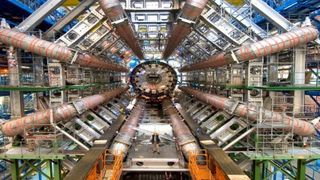
The tech-pocalypse
It's best not to put too much stock in doomsday theories. There are probably thousands of freak phenomena that, at any second, could literally wipe the human race off the face of the planet.
That said, a little education on how the world might come to an end, mixed in with a bit of black humor, of course, might actually prevent that unfortunate future from ever coming to fruition. Or, you know, further a self-fulfilling prophecy. (That has to be the plot of some movie, right?)
While there are hundreds (if not thousands) of ways that it could all go down, let's keep the discussion focused on only the most probable technology-fueled causes. If it can't be the topic of a Michael Bay – or, ahem, J.J. Abrams – film, you won't find it here.

Skynet (or takeover by AI robots)
We've all joked about the vending machine revolution or how Japanese robots are secretly planning a coup-d'etat, but this is something the government and some of the smartest people on the planet, like Elon Musk and Stephen Hawking, are taking seriously. (Don't believe me? Check out the Future of Life Institute's open letter to autonomous weapons.)
Now, we're still a few years away from computers teaching one another to kill humans – I can't even get Siri to give me directions to the nearest McDonald's – but there are plenty of companies and individuals that have taken artificial intelligence one step closer to free thought.
How much time is left on the clock? By my expert calculations (read: a quick Google search), it looks like we have at least five years before robots are any real threat to mankind.

Grey Goo
Here's the thing: if big robots don't end up killing us, little ones will. Grey Goo is an apocalypse scenario that entails self-replicating nanobots that black out the sun, essentially covering the planet's surface in microscopic machines that have no end-goal other than to build more of themselves.
For this to happen, admittedly, scientists would really need to ditch any code of ethics. Some really smart, electrical-biomedical-computer engineer super genius would have to not only create one of these little guys and teach it how to make copies of itself, but said human being would need to figure out how to get it to replicate without the need for additional resources, too. It's a pretty tall order, even for someone who has, at minimum, three PhDs.
How much time is left on the clock? Until we start seeing companies regularly using nanotechnology to solve everyday problems, I'm not going to lose sleep over Grey Goo.

Nuclear reactions
OK, OK, I know nuclear reactions, like the kind found in weapons and power plants, isn't our number one topic here at techradar, but that doesn't make it any less of a potentially dangerous technology. As a form of clean power, I'm all for amassing uranium and performing the ol' one-two fission process on it for a sustainable future.
But, as a weapon, I'm not really down with the whole "mass expansion of kinetic energy" thing. The potential game-ending scenarios here are either someone hacks the launch of several US nuclear missiles or one severely detached world leader pulls the trigger on World War III.
How much time is left on the clock? Neither are super likely, to be honest. But, just to be sure, you should probably give your neighbor a hug and stop hating on people from countries you've never been to.

Particle acceleration gone wrong
You're probably well aware of what the Large Hadron Collider (LHC) is at this point. But, just as a refresher, this super-powered particle accelerator based in Switzerland sends streams of protons and ions toward one another at almost the speed of light and records the results.
While the LHC simply can't produce Interstellar-esque black holes, there are a few extensive theories lumped together called "Physics beyond the standard model." In short, the machine is entering uncharted territory that could redefine physics altogether.
Now, we've gotten a lot of new knowledge from the LHC, but there's still a fair amount of experimentation going on in the world of dark matter and dark energy. (Not that we know what either of those are exactly.) It's pretty unlikely that the world's top scientists and engineers will run into a catastrophic collision, but one wrong turn and we could find ourselves sitting on the edge of an event horizon.
How much time is left on the clock? A few seconds? I don't know, man. Considering this thing runs 24/7 at double the strength than it did two years ago, we might be minutes away from getting sucked into a wormhole.

The Singularity
Another apocalypse scenario in the field of artificial intelligence, "the Singularity" isn't about robots destroying humanity as much as it is about robots helping humans evolve into something … more. Experts in the field include Ray Kurzweil, author of Fantastic Voyage: Live Long Enough to Live Forever and How to Create a Mind, and researchers Stuart Armstrong and Kaj Sotala.
The basic premise starts with simple augmentations, cybernetic enhancements that make us just a little faster or a little smarter. It ends with the complete integration of all human knowledge into a computer that in its infinite wisdom and immortal shell contains everyone – Neuromancer style.
How much time is left on the clock? According to Armstrong, "It's not fully formalized, but my current 80% estimate is something like five to 100 years." So, you'll either live long enough to see it or you'll leave behind children who will. Fun.

Mass infertility
Dozens of movies have broached the subject of mass infertility. And while it's easy to laugh them off with the global population rising year after year, we might have to give them some honest attention in the coming years.
So, why are we pinning the inability to procreate on your new laptop? Research suggests that having electronics so close to our family business – e.g. carrying a cellphone in your pocket or resting a poorly-ventilated laptop on your lap – might be decreasing our ability to make … ahem, genetic material.
How much time is left on the clock? Theoretically, if you only procreate once, we've got – according to math – another 32 generations in the scenario where two people can only conceive at max one child. (But, let's be real, people would find a way to procreate more.)

Super virus
At the intersection of super-powered technology and advanced biomedical research is the super virus, a genetically engineered monstrosity that could slip into our bloodstreams and wipe us out in a matter of days.
Games, movies, television and books have covered this idea nine ways to Tuesday, but that's probably because the idea of someone manufacturing a super virus scares the bejeezus out of us. Maybe it's not a one-man job. Maybe a whole military goes in on it. I guess we won't know how this one could happen until it's too late.
How much time is left on the clock? Maybe it's already happening and we just don't know it yet. Better wipe down your keyboard and sterilize your phone screen just to be safe. (Protip: this is a good idea even if you aren't living in fear of the apocalypse.)
Clearly, we're just joshin', folks. This piece is not, by any means, to be used as a source of 100% scientifically sound evidence of an impending apocalypse. Maybe 95%? OK, more like 5%.

Nick Pino is Managing Editor, TV and AV for TechRadar's sister site, Tom's Guide. Previously, he was the Senior Editor of Home Entertainment at TechRadar, covering TVs, headphones, speakers, video games, VR and streaming devices. He's also written for GamesRadar+, Official Xbox Magazine, PC Gamer and other outlets over the last decade, and he has a degree in computer science he's not using if anyone wants it.
Most Popular


